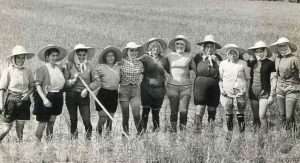Article index
"Giovanna Daffini was a great mother, parent not only of children, but entity and tutelary god of our land and our culture"
(Massimo Zamboni, guitarist, songwriter, writer)
It is not easy to label the voice of Giovanna Daffini or to insert it in one of the many categories that we are used to thinking about when it comes to singing. Giovanna's voice was something unique, a not "polite" voice or set, spontaneous and instinctive, a mixture of power and incisiveness.
Gualtiero Bertelli, Venetian singer -songwriter and founder, in the 1960s, was hit by the Popular Canzoniere Veneto, when he listened to her for the first time, so much so as to declare in an interview: "I have never heard a voice that excited me so much. And I have heard of voices, beautiful, beautiful, less beautiful, interesting, less interesting, but voices so I have not heard of it anymore. "
The director Victor Tognola was hit, who made a documentary about Giovanna's life and who said about her: “After listening to her, I was hit in the heart, like many others who over time I had the opportunity to know. Giovanna's voice has left a mark that does not go away easily. "
Giovanna Marini remained equally impressed, especially by the power of her acute. Giovanna Daffini was born in Villa Savoia in the province of Mantua on April 22, 1914.
 His was a peasant family, of humble origins. Giovanna Daffini had learned from his father to play the guitar and from a very young age he had begun to perform in churches, taverns, country festivals in wedding ceremonies, in parties. From 1927 to 1952 he had worked as a Mondina in the Piedmontese rice fields and Lomellina and during those long months he had been able to learn the working songs of the Mondariso, who had contributed to fortifying his voice, giving her the opportunity to sing for a long time without tiring her. The Mondariso, as well as it is, worked in the rice fields of northern Italy for about 40 days a year, spending endless hours bent forward, with their hands and feet in the water, to remove the weeds that infested the young rice seedling.
His was a peasant family, of humble origins. Giovanna Daffini had learned from his father to play the guitar and from a very young age he had begun to perform in churches, taverns, country festivals in wedding ceremonies, in parties. From 1927 to 1952 he had worked as a Mondina in the Piedmontese rice fields and Lomellina and during those long months he had been able to learn the working songs of the Mondariso, who had contributed to fortifying his voice, giving her the opportunity to sing for a long time without tiring her. The Mondariso, as well as it is, worked in the rice fields of northern Italy for about 40 days a year, spending endless hours bent forward, with their hands and feet in the water, to remove the weeds that infested the young rice seedling.
It was a massacring work, often carried out under the scorching sun of summer, in continuous fight against insects, bisce and mosquitoes that did not give respite. The owner, owner of the rice field, observed and constantly controlled that the work would proceed in the best way. Women often mistreated and if something was not working or was not enough up to expectations, the dismissal was insured.
The singing then had the function of making those long hours less heavy, establishing bonds of unity and solidarity between women, giving rhythm to collective work. The powerful voices of the marshads resoned in large spaces, they felt at a great distance, because everyone could listen to them. Through singing, women often intended to communicate to the owner what they wanted him to know and in this Giovanna Daffini did not spare himself, his was many times a song of struggle and protest, like Sciur Masteruno from Li Beli Braghi Bianchi , one of the songs better known in his repertoire, where the owner is accused of not paying enough that very heavy work, which should have been paid in the right and fair way.
The owner was described with "Belli Braghi Bianchi" because, unlike the marshads, he did not get dirty working with his legs immersed in the mud for hours.
Text
Sciur Master from Li Béli Braghi Bianchi,
fora li palanche who antiques to cà.
In Scuza, Sciur Masteruno, s'a èm fat tribulèr,
the era li prèmi faces, that the saiévum cuma fèr.
And it does not go to months and not even to weeks,
it goes to a few hours, and then after we go to Cà.
And when at the train to S-Cefla the Mundéin a La Statssion
with the Cassietta in the spala; Up and down the Vagon!
Translation:
Master from the beautiful white braces, out of money, which we go home. Excuse me, Mr. Master, if we made him think, were the first few times, and we didn't know how to do it. And it does not go to months and not even to weeks, it goes a few hours and then after we go home.
And when the train whistles them to the station with the box on the shoulder up and down for the wagons.
In 1933 Giovanna Daffini is in Gualtieri, Emilia, in the hometown of the painter Antonio Ligabue, who has the opportunity to know and with whom he managed to establish a relationship of trust. He lived mainly in the woods and occasionally went to see her. Giovanna prepared something to eat and he was happy, because she did not treat him badly and did not derive him as the other women in the country did.
A sort of tacit understanding, between humble and simple people. In Gualtieri Giovanna meets Vittorio Carpi, a widower violinist with four children and decides to marry him, giving life to an artistic, as well as emotional partnership. Together the children of him grow, to which Ermanno will later be added, the only son born from their union.
Together they bring their music to the parties in the square, in the markets, in the taverns, weddings, baptisms, family parties. Vittorio considers himself the true professional, coming from a family of virtuous violinists. For him musically Giovanna Daffini is not up to par, it is mediocre and of little value. In reality, she will take flight, when in 1962 the ethnomusicologists Roberto Leydi and Gianni Bosio will listen to her and, affected by the emotional force of her voice and her vital, strong and courageous character, will propose them to affect a disc and to collaborate With the new Italian songbook, a musical group founded in those years in Milan, with the aim of recovering and spreading popular, work and protest songs.
This new adventure will lead her in 1964 to participate in the Festival dei Due Mondi in Spoleto with the show Bella Ciao, which will follow Pietà died it and, in 1966, the show of popular songs will think and sing, with the direction of Dario Fo , in addition to countless concerts in the squares and theaters throughout Italy and abroad.
Giovanna Daffini died in Gualtieri on July 7, 1969, after a long and painful illness. In today's music scene, a voice like his would have no space, too particular and too linked to protest and denunciation repertoires, a popular, ancient voice, an "uncomfortable" voice.
But it is also thanks to her and her determination that it was possible to recover and enhance a heritage that represents a great wealth for our country, from a historical and above all human point of view.
Other songs by Giovanna Daffini:
https://www.youtube.com/watch?v=sp-7kecz6OW
https://www.youtube.com/watch?v=hqlokkqze5u
https://www.youtube.com/watch? V = YTDWR-BRMRI
Sources: https://www.youtube.com/watch?v=mxio5cdolfc
http://www.enciclopediadedelonne.it/biographie/giovanna-daffini/
Chiara Ferrari- The women of the Folk- editions4
The beloved parent- documentary of Victor Tognola
Read also the article: Siing Soong Playlist 2








